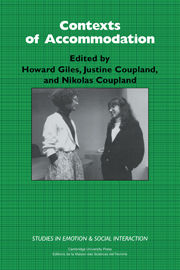Book contents
- Frontmatter
- Contents
- List of contributors
- 1 Accommodation theory: Communication, context, and consequence
- 2 Audience accommodation in the mass media
- 3 Accommodation on trial: Processes of communicative accommodation in courtroom interaction
- 4 Accommodation in medical consultations
- 5 Accommodation and mental disability
- 6 Accommodation in therapy
- 7 Accommodation in native-nonnative interactions: Going beyond the “what” to the “why” in second-language research
- 8 Interethnic accommodation: The role of norms
- 9 Organizational communication and accommodation: Toward some conceptual and empirical links
- Index
5 - Accommodation and mental disability
Published online by Cambridge University Press: 18 March 2010
- Frontmatter
- Contents
- List of contributors
- 1 Accommodation theory: Communication, context, and consequence
- 2 Audience accommodation in the mass media
- 3 Accommodation on trial: Processes of communicative accommodation in courtroom interaction
- 4 Accommodation in medical consultations
- 5 Accommodation and mental disability
- 6 Accommodation in therapy
- 7 Accommodation in native-nonnative interactions: Going beyond the “what” to the “why” in second-language research
- 8 Interethnic accommodation: The role of norms
- 9 Organizational communication and accommodation: Toward some conceptual and empirical links
- Index
Summary
Introduction
Coupland et al. (1988) introduce a “sociolinguistically elaborated model” of speech accommodation theory (SAT) in which the speaker attends to the interlocutor's productive performance (the focus of more traditional SAT) and projected ability to comprehend, as well as conversational needs, and to the role relations between the conversational partners. Of its four components, the discourse management component that responds to the addressee's conversational needs is understood to play the central role in what has been recast as “communicative accommodation theory (CAT)” (see, e.g., Coupland et al. 1990). The purpose of this expanded accommodation framework is “to model and explain degrees and types of communicative ‘attuning’ in discourse, and contextualise these with considerations of social norms, beliefs and expectations, self- and other categorizations, and interactional goals, as they influence both encoding and decoding choices.“ (Coupland et al. 1990: 3).
In this chapter, I apply this interactionally grounded sociolinguistic framework of accommodation theory to a situation of potential and actual miscommunication – conversations between normal and mentally disabled interlocutors, including Alzheimer's disease patients, schizophrenics and the mentally retarded. First, I discuss the disability-linked decreased ability to accommodate the conversational partner along dimensions of interpretive ability and discourse management, viewing this as a contributing factor to communicative breakdown. Second, in the face of this type of breakdown, I examine the normal other's use of accommodation both to the mentally disabled partner's perceived interpretive competence and to his or her conversational needs, seen as a way to maintain a balance between accomplishing what one wants to propositionally while maintaining both the speaker's and the hearer's face (see Brown and Levinson 1987; Goffman 1967; Lakoff 1973, 1979) in the interaction.
- Type
- Chapter
- Information
- Contexts of AccommodationDevelopments in Applied Sociolinguistics, pp. 157 - 186Publisher: Cambridge University PressPrint publication year: 1991
- 16
- Cited by



